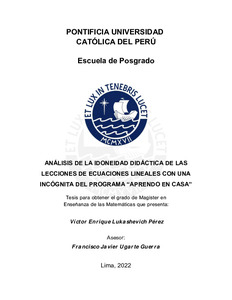| dc.contributor.advisor | Ugarte Guerra, Francisco Javier | |
| dc.contributor.author | Lukashevich Pérez, Víctor Enrique | |
| dc.date.accessioned | 2022-08-09T15:08:32Z | |
| dc.date.available | 2022-08-09T15:08:32Z | |
| dc.date.created | 2022 | |
| dc.date.issued | 2022-08-09 | |
| dc.identifier.uri | http://hdl.handle.net/20.500.12404/23000 | |
| dc.description.abstract | En la actualidad las investigaciones de la didáctica matemática tienden a intentar describir y
explicar lo que sucede durante los procesos de instrucción, lo que hace necesario ahondar en la
búsqueda de acciones que favorezcan la optimización de dichos procesos. En tal sentido, el
presente trabajo emplea las nociones de la idoneidad didáctica introducida por el Enfoque
Ontosemiótico de la Cognición y la Instrucción Matemática, con el objetivo de valorar las
lecciones sobre las ecuaciones lineales con una incógnita del programa Aprendo en Casa desde
las dimensiones epistémica, ecológica y mediacional. Para esto, partimos de la hipótesis de que
dicho programa posee un bajo grado de idoneidad epistémica, ecológica y mediacional. Para
validar esta hipótesis, se diseña e implementa una guía de análisis de idoneidad didáctica con el
que se analiza y valora las lecciones del programa a partir de un conjunto de indicadores que
permiten establecer el grado de idoneidad para cada una de las dimensiones que se abordan.
Finalmente se determina que las sesiones del programa que fueron sujetas a estudio tienen una
idoneidad media debido a la desarticulación de los componentes, como son los procedimientos
y propiedades en la dimensión epistémica. Con respecto a la mediacional, el insuficiente tiempo
para el desarrollo de los contenidos limita el logro de los estándares de aprendizaje que se
esperan alcanzar además se observaron carencias en aspectos como la apertura hacia la
innovación y las conexiones intra e interdisciplinarias desde la ecológica. | es_ES |
| dc.description.abstract | At present, the investigations of mathematical didactics tend to try to describe and explain what
happens during the instruction processes, which makes it necessary to delve into the search for
actions that favor the optimization of said processes. In this sense, the present work uses the
notions of didactic suitability introduced by the Ontosemiotic Approach of Cognition and
Mathematical Instruction, with the aim of evaluating the lessons on linear equations with an
unknown of the Aprendo en Casa program from the epistemic dimensions. , ecological and
mediational. For this, we start from the hypothesis that said program has a low degree of
epistemic, ecological and mediational suitability. To validate this hypothesis, a didactic suitability
analysis guide is designed and implemented with which the lessons of the program are analyzed
and assessed based on a set of indicators that allow establishing the degree of suitability for each
of the dimensions that are addressed. Finally, it is determined that the sessions of the program
that were subject to study have an average suitability due to the disarticulation of the components,
such as the procedures and properties in the epistemic dimension, with respect to the mediational
one, the insufficient time for the development of the contents. it limits the achievement of the
learning standards that are expected to be achieved, in addition, deficiencies were observed in
aspects such as openness towards innovation and intra- and interdisciplinary connections from
the ecological point of view. | es_ES |
| dc.language.iso | spa | es_ES |
| dc.publisher | Pontificia Universidad Católica del Perú | es_ES |
| dc.rights | info:eu-repo/semantics/openAccess | es_ES |
| dc.rights.uri | http://creativecommons.org/licenses/by-sa/2.5/pe/ | * |
| dc.subject | Matemáticas--Estudio y enseñanza | es_ES |
| dc.subject | Ecuaciones lineales | es_ES |
| dc.subject | Educación virtual | es_ES |
| dc.title | Análisis de la idoneidad didáctica de las lecciones de ecuaciones lineales con una incógnita del programa “Aprendo en casa” | es_ES |
| dc.type | info:eu-repo/semantics/masterThesis | es_ES |
| thesis.degree.name | Maestro en Enseñanza de las Matemáticas | es_ES |
| thesis.degree.level | Maestría | es_ES |
| thesis.degree.grantor | Pontificia Universidad Católica del Perú. Escuela de Posgrado | es_ES |
| thesis.degree.discipline | Enseñanza de las Matemáticas | es_ES |
| renati.advisor.dni | 06779604 | |
| renati.advisor.orcid | https://orcid.org/0000-0001-5071-89240000-0001-5071-8924 | es_ES |
| renati.author.dni | 09876747 | |
| renati.discipline | 199117 | es_ES |
| renati.juror | Gaita Iparraguirre, Rosa Cecilia | es_ES |
| renati.juror | Ugarte Guerra, Francisco Javier | es_ES |
| renati.juror | Gonzales Hernandez, Cintya Sherley | es_ES |
| renati.level | https://purl.org/pe-repo/renati/level#maestro | es_ES |
| renati.type | https://purl.org/pe-repo/renati/type#tesis | es_ES |
| dc.publisher.country | PE | es_ES |
| dc.subject.ocde | https://purl.org/pe-repo/ocde/ford#5.03.01 | es_ES |






